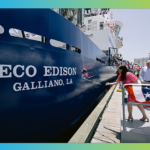As the maritime industry accelerates its digital transformation journey, a new class of technology is emerging to redefine how ships are operated and managed – AI Agents. These intelligent software entities promise to make maritime operations not only more efficient but also safer, more sustainable, and better aligned with regulatory demands.
What Is an AI Agent?
An AI Agent, or Artificial Intelligence Agent, is a self-directed software system that can perceive its environment, make informed decisions, and take autonomous actions toward a specific goal. Unlike traditional software, which follows pre-defined rules, AI agents can learn from data, adapt to changing conditions, collaborate with humans or other agents, and continuously improve their performance.
Imagine an AI agent as a virtual assistant with initiative – capable not just of responding to instructions, but proactively analyzing complex scenarios, recommending actions, and, when appropriate, executing them. These agents are powered by advanced machine learning models, sensor integrations, and domain-specific objectives, allowing them to act intelligently in dynamic, high-stakes environments like shipping.
Examples of AI Agents Across Industries
Before diving into maritime applications, here are a few examples of AI agents in other sectors:
- Finance: Autonomous trading agents monitor financial markets in real time and execute high-frequency trades based on patterns and risk profiles.
- E-commerce: Intelligent support agents answer customer queries, personalize product recommendations, and resolve service issues around the clock.
- Manufacturing: Quality assurance agents detect anomalies in production lines and automatically trigger corrective workflows.
- Smart Homes: Virtual agents adjust lighting, security, and climate control based on behavioral patterns, occupancy, and external data like weather.
AI Agents in Maritime Operations
Given the maritime industry’s inherent complexity – distributed operations, harsh environments, regulatory pressures, and large datasets – AI agents are exceptionally well-suited to drive operational excellence. Here are some key roles they can play:
- Predictive Maintenance Agents
- What they do: Continuously monitor anomalies in engine data (temp, pressure, vibration) and performance, its overall health including fuel systems, and fluid analysis.
- Why it matters: Early detection of anomalies prevents catastrophic failures, reduces downtime, and optimizes maintenance intervals.
- Example: An AI agent identifies unusual vibration patterns in a main engine component, alerts the technical team, and recommends inspection before the next port call.
- Voyage Optimization Agents
- What they do: Analyze weather, current, cargo constraints, fuel prices, and charter party clauses to suggest optimal routes.
- Why it matters: Enhances fuel efficiency, ensures regulatory compliance, and minimizes ETA deviations.
- Example: While en route, an agent recalculates a safer and more economical route to avoid a storm, cutting fuel consumption by 8%.
- Compliance and Documentation Agents
- What they do: Automate the verification and submission of logbooks, emission data, and regulatory reports.
- Why it matters: Reduces administrative burden and human error, and ensures compliance with IMO and regional regulations.
- Example: An AI agent flags inconsistencies in fuel oil consumption reports before a port state control inspection.
- Digital Twin Agents
- What they do: Create and maintain a real-time virtual replica of a vessel to simulate behavior and diagnose issues.
- Why it matters: Enables shore-based teams to support crews with hull performance efficiency, predictive diagnostics and operational insights.
- Example: A digital twin agent runs simulations to optimize cargo distribution and vessel trim for reduced drag.
- Port Call Optimization Agents
- What they do: Synchronize vessel ETA with port logistics – berthing slots, cargo readiness, and tug availability.
- Why it matters: Reduces idle time, fuel waste, and demurrage costs.
- Example: The agent recommends slowing the vessel by 2 knots to match berth availability, avoiding a 10-hour anchorage delay.
- Energy Efficiency and Decarbonization Agents
- What they do: Monitor real-time emissions, fuel mix, and vessel speed to maintain optimal carbon intensity ratings.
- Why it matters: Helps shipowners stay within IMO CII targets and avoid future penalties or commercial disadvantages.
- Example: The agent identifies that sailing at 87% MCR leads to an E-rating and recommends a new operating profile to retain a C-rating.
- Crew Support and Safety Agents
- What they do: Track work-rest compliance, detect signs of fatigue, and monitor for safety violations.
- Why it matters: Enhances onboard safety, reduces risk of human error, and supports wellbeing.
- Example: An AI agent alerts the captain when work-rest logs suggest fatigue risks for the second engineer.
The Strategic Impact
AI agents are not just tools – they represent a paradigm shift. By embedding intelligence at key decision points across fleet operations, shipowners and operators can:
- Unlock real-time insights from data once buried in siloed systems
- Increase automation without sacrificing control
- Scale best practices across vessels and teams
- Make maritime operations more agile, resilient, and sustainable
In short, AI agents move the industry from dashboards to decisions – where software doesn’t just display data but helps act on it intelligently.
Source: ZeroNorth






